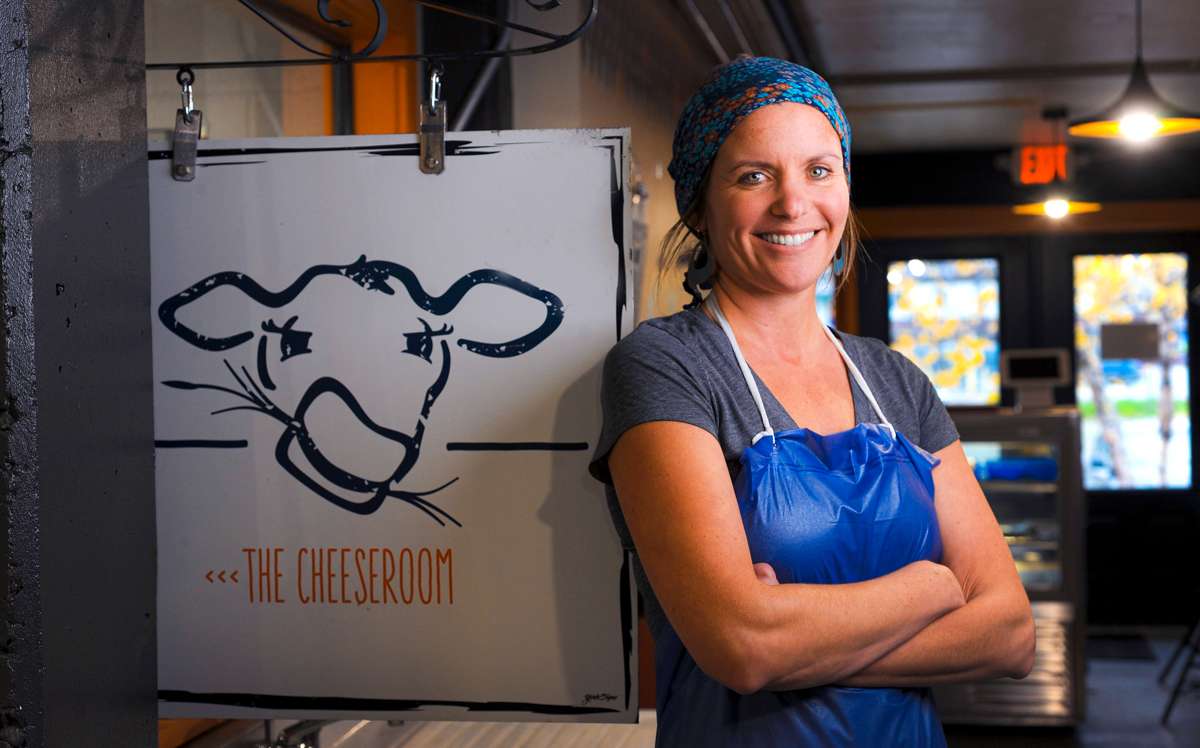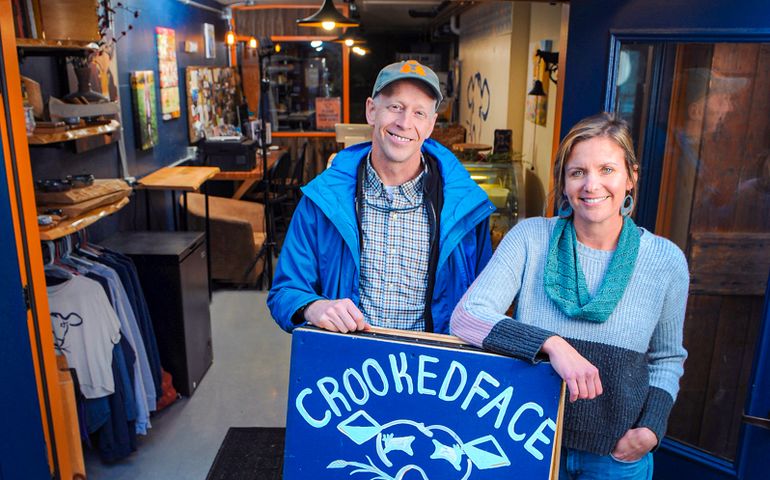
At Legal Food Hub, attorneys help food businesses, pro bono
 Photo / Fred Field
Amy Rowbottom, owner of Crooked Face Creamery in Norridgewock. sought legal help in protecting her company’s brand. Legal Food Hub matched her with attorney David McConnell of Perkins Thompson, who helped with trademark issues.
Photo / Fred Field
Amy Rowbottom, owner of Crooked Face Creamery in Norridgewock. sought legal help in protecting her company’s brand. Legal Food Hub matched her with attorney David McConnell of Perkins Thompson, who helped with trademark issues.
Amy Rowbottom has been making artisanal cheeses for about 10 years.
Taking Skowhegan-based Crooked Face Creamery from a part-time startup to an established food producer made her realize she needed legal help to protect her products and brand. But she had never done any legal work or trademarking on her own and she operates on slim margins, scarcely able to afford the expense of hiring a lawyer.
Taking part in a business boot camp in 2018, she heard about the Legal Food Hub, a program of the Conservation Law Foundation that provides pro bono legal services to food producers and farmers.
After reaching out, she was put in touch with David McConnell, an attorney with Perkins Thompson in Portland who has a practice in trademark and copyright issues. They met in 2018 and McConnell shortly thereafter filed a trademark application for Rowbottom’s logo with the U.S. Patent and Trademark Office. The procedure is simple on its face, says McConnell.
“But there are a lot of traps for the unwary,” he says. “You have to precisely identify each class of goods and services that the mark applies to.”
Saving on legal fees
Central to Rowbottom’s brand is a logo of a cow with a crooked face.
“She was being proactive,” says McConnell. “She recognized it was worth getting the federal trade mark registration.”
After nearly a year, which is how long the trademark process typically takes, the problem has been solved. Rowbottom only had to pay for the trademark filing fee. Thanks to the program, she saved between $1,000 and $5,000 on legal fees, McConnell estimates — a big chunk of change for a bootstrap operation.

That kind of aid illustrates Legal Food Hub’s mission. Founded in 2014, it connects eligible farmers, food entrepreneurs and organizations that support them with attorneys from a growing network who work on their legal issues for free, with an overall goal of helping to grow the farm and food sector.
The program operates in Maine, Massachusetts, Connecticut and Rhode Island, with plans to expand to the other New England states. Since its launch, the hub has handled 375 cases, offering $2.5 million in pro bono legal services in the four states.
In Maine, the hub is managed by the Conservation Law Foundation’s Portland office.
“We saw a trend and a growing need in the farming and food entrepreneur community for affordable legal services,” says Phelps Turner, a staff attorney who manages the Maine hub. “So we leveraged our connections in the legal community throughout New England to create this program. We identified attorneys and law firms willing to volunteer their time and provide free legal services to farmers and food entrepreneurs.”
Farms and food businesses in New England often run on tight margins, yet have many legal needs, Turner says.
“They have limited budgets,” he notes. “We saw that, often, the businesses were not able to afford a lawyer for matters they identified as legal needs.”
Although some of the legal issues facing food producers have evolved over time, such as food safety regulation, generally speaking the legal landscape isn’t much different from any other type of business, Turner notes.
“I think it’s more that the profit margins remain small or perhaps are even shrinking among farmers and food entrepreneurs, so they’re dealing with limited resources and have to make choices,” he continues.
That might result in food producers not being able to retain legal counsel to deal with standard matters.
“Cases we’re placing through the Legal Food Hub in Maine typically involve contracts, leases for land or business space, purchase and sale agreements related to real estate, and conservation and agricultural easements,” he says. “There are also cases involving entity formation — how a business chooses to structure itself and protect itself in terms of liability, along with related tax implications. There are employment and labor issues — making sure they conform with minimum wage and overtime requirements, or know how to work with apprentices and seasonal workers. There are state and federal laws they have to navigate.”

Intellectual property and trademark law applies to food entrepreneurs — people making value-added products like Rowbottom’s specialty cheeses.
“They’re often seeking to protect their recipes, their name and their logo,” Turner says. “Ideally, you seek to protect those early on so you’re not facing an issue later where someone else starts using your recipe, name or logo.”
Dramatic need
In Maine, the hub has placed 165 cases over the past five years.
“We’ve seen a dramatic need and it’s not tapering off,” Turner says.
The hub spreads awareness of its service through outreach to the food and farm community — setting up a table at the Maine Agricultural Trade Show, for example.
“We also constantly try to grow our network of volunteer attorneys,” says Turner. “We want to reach as many farms and entrepreneurs as we can, and we need a range of lawyer expertise and also lawyers who are geographically available throughout the state.”
For lawyers, the hub offers educational programs around food and farm issues, like a continuing legal education course on agricultural easements and a new online portal with food- and farm-related legal resources and guides.
McConnell has helped several clients through the hub so far. In addition to Rowbottom, another client was the Maine Federation of Farmers’ Markets when it needed help filing for trademark protection. His service probably saved the federation $1,000 to $2,000. The federation also received help from attorney Kenleigh Nicolletta of Brann & Isaacson in Lewiston in filing for 501(c)(3) nonprofit status.
The federation — a resource for farmers’ markets that works with farmers, consumers and communities — needed trademark protection for its Maine Harvest Bucks program. The program allows food assistance recipients to receive a bonus dollar for every dollar spent at participating farmers’ markets. Because the bonus money must be spent on fresh produce, the idea is that the program helps the recipients and also provides extra income to farmers.
The program’s name was originally used by a number of nonprofits but lacked a consistent message, explains the federation’s director, Jimmy DeBiasi. Several years ago, control of the program was passed to the federation, which decided trademark protection was key to maintaining the integrity of the brand’s message. They went to the hub.
“As an under-resourced organization, we all of a sudden had legal counsel that helped us negotiate with other organizations to protect Maine Harvest Bucks and create licensing agreements that worked for everybody,” DeBiasi says.
Arcane language
“Usually, clients are not well-versed in the arcane aspects of trademark or copyright law, which you wouldn’t expect them to be,” McConnell says. “That’s where a lawyer adds value.”
McConnell tries to meet clients face-to-face, ideally at their operation.
“I can get a better sense for what may be some issues that they might not have initially identified as something they needed help with,” he says. “And we can do some creative planning to get things on the right trajectory.”
McConnell doesn’t mind working pro bono. As it turns out, his practice is largely focused on the food economy anyway, and he co-owns a new rum distillery in Portland, Three of Strong Spirits.
“This work dovetails nicely with what I was already doing for paying clients,” he says. “It makes Maine a much more vibrant place to live in, if we have active systems of producers who are making delicious food and drink.”
Ongoing help
Legal Food Hub helped Shovel & Spoon, a farm and farm-to-table catering business in Limington, set up a limited liability corporation, acquire farmland and protect its brand.
The business started in 2018 in Acton, then purchased 30 acres in Limington and moved there.
The hub connected co-owners Tomer Kilchevsky and Courtney Jean Perry with several lawyers on successive issues. Connections came quickly and turnarounds were fast, Kilchevsky says.
“We’re farmers and cooks and have little experience in law and contracts, so having someone there to guide us through the process was extremely helpful,” he says. “And it’s not like they helped us once and went away. They check up occasionally on how things are working out.”
They estimate they’ve saved $3,000 to $4,000 in legal fees.
What would folks typically do without the hub?
“I think some people were going without legal representation,” Turner says. “I think some have been trying to address some of these issues themselves, or were just not addressing them at all. The fact that there have been 165 cases in Maine, in five years, suggests there was, and still is, a great need.”
“Putting it through the intellectual property lens, they might build a product or a brand, then find out later there’s a Goliath who swoops in and crushes their David, so to speak, with a preexisting mark,” says McConnell. “Or maybe they didn’t have someone help them write a good contract at the front end. Or maybe it’s not in writing at all, but just a verbal understanding. Later on, if there’s a disagreement, sometimes they’re not in a position to move forward in a way they anticipated.”
At Crooked Face Creamery, Rowbottom has about 40 wholesale accounts and two distributors, just bought a larger cheese pasteurizer and is in the process of scaling up. She’s reached out to McConnell on additional issues, including researching lease arrangements and problems with an equipment supplier.
Without McConnell’s help, Rowbottom says, she would have had to hire a lawyer or do the work on her own.
“There are so many things to do when you’re running a business,” she says. “To weave your way through those things, when somebody else has all the resources and knows the process, is a huge time-saver. And it’s reassuring to know it’s going to be done right.”










0 Comments